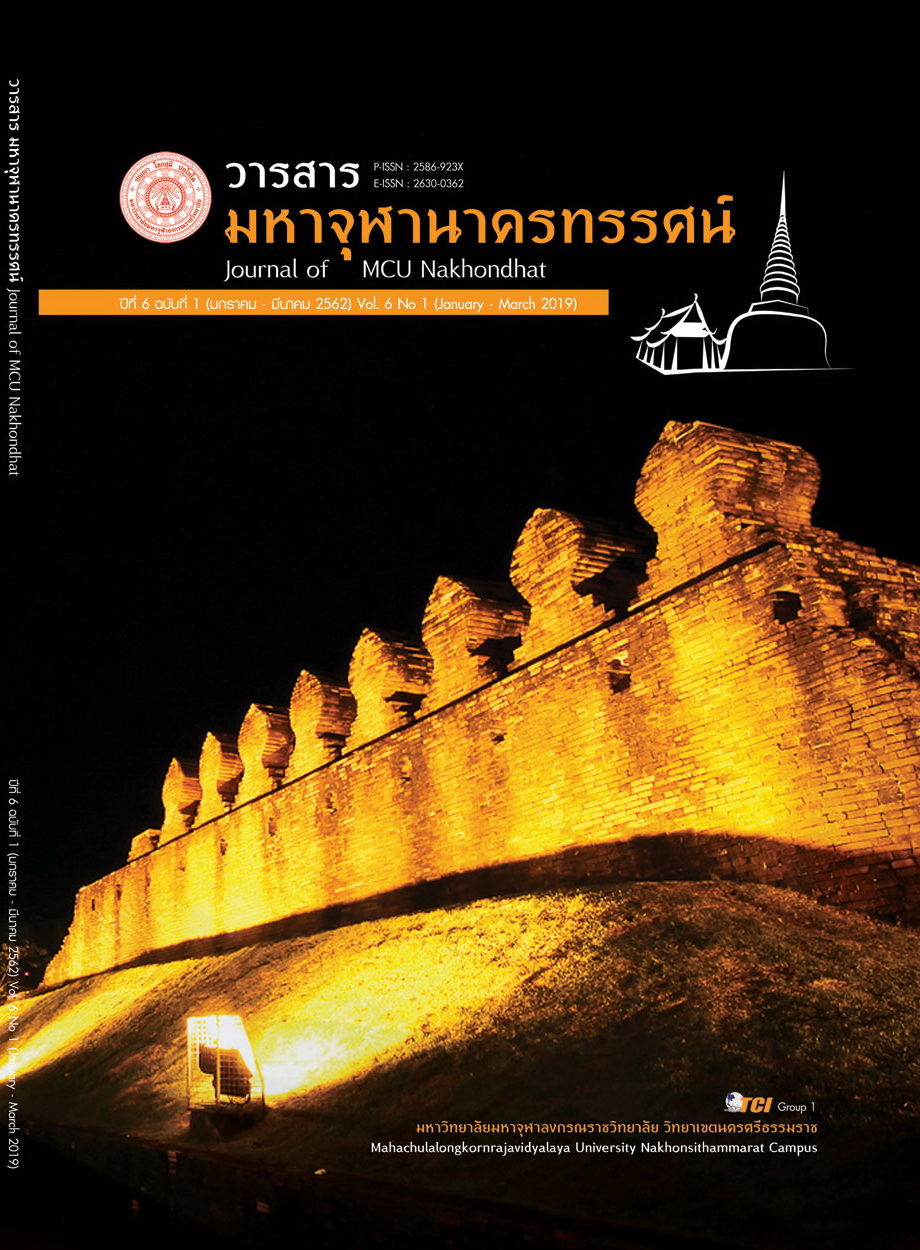DEVELOPMENT OF EDUCATIONAL ADMINISTRATION MODEL BASED ON BUDDHIST EDUCATIONAL ADMINISTRATION OF MAHAYANA SANGHA IN THAILAND.
Main Article Content
Abstract
This dissertation aims to develop an educational administration model based on Buddhist educational administration of Mahayana Sangha in Thailand. The research process was started by the study of the current educational administration condition of Mahayana Sangha from 6 schools. The data were collected from the school stakeholders, documents, research works and connoisseurship with 11 experts. The study results showed that:
- 1. The educational administration of Mahayana Sangha in Thailand was divided into 4 main sections; 1) Academic administration, the school administrators had to adjust the level of teaching and learning, develop learning media for learnercentered learning, and implement the modern technology in school, 2) Budget administration, with limitation of budget, schools had to raise the fund from people, community and school networks, 3) Personnel administration, teachers had to be developed in teaching skills and the number of teachers had to be increased, and 4) General administration, teachers and students had been encouraged in teamwork and giving assistance to each other.
- 2. The development of educational administration according to Buddhist educational administration of Mahayana Sangha in Thailand consisted 4 components; 1) Principle, 2) Objective, 3) Work process, 4) Buddhist administration education principles and 5) Assessment. The integration of Buddhist educational administration can be done as follows; (1) Academic administration integrated with Yonisomanasikara and Iddhipada, (2) Buddget administration integrated with 3 wholesome roots, (3) Personnel administration integrated with the principles of the tenfold code of the king and Brahmavihara Dhamma, and (4) General administration integrated with the principles of Kalyanamittata, Bala, and training, further study and field trip study.
- 3. The educational administration model based on Buddhist educational administration approved by connoisseurship consisted of principle, objective, process, and assessment based on the 4 components of educational administration system in order to operate educational management and observe the organizational culture of schools under the administration of Mahayana Sangha in Thailand effectively and successfully.
Article Details
How to Cite
คั้นพ๊าบ (แสงอินตา) พ., ฐิตวฑฺฒโน พ., & งามประโคน ส. (2019). DEVELOPMENT OF EDUCATIONAL ADMINISTRATION MODEL BASED ON BUDDHIST EDUCATIONAL ADMINISTRATION OF MAHAYANA SANGHA IN THAILAND. Journal of MCU Nakhondhat, 6(1), 357–374. retrieved from https://so03.tci-thaijo.org/index.php/JMND/article/view/177024
Section
Research Articles
References
พระมหาธีรเพชร มาตพงษ์. (2561). การสังเคราะห์รูปแบบการบริหารงานวิชาการโรงเรียนพระปริยัติธรรม แผนกสามัญศึกษา. ใน วิทยานิพนธ์ปรัชญาดุษฎีบัณฑิต. บัณฑิตวิทยาลัย. มหาวิทยาลัยสยาม.
พระมหาสมบัติ ธนปญฺโญ (ฉลอง). (2557). ยุทธศาสตร์เชิงพุทธในการบริหารโรงเรียนพระปริยัติธรรม แผนกสามัญศึกษา. ใน วิทยานิพนธ์พุทธศาสตรดุษฎีบัณฑิต. บัณฑิตวิทยาลัย. มหาวิทยาลัยมหาจุฬาลงกรณราชวิทยาลัย.
วันทนา เนาว์วัน. (2558). การพัฒนาภาวะผู้นาตามหลักพุทธธรรมของบุคลากร โรงเรียนพระปริยัติธรรม แผนกสามัญศึกษา กลุ่ม 3. ใน วิทยานิพนธ์พุทธศาสตรดุษฎีบัณฑิต. บัณฑิตวิทยาลัย. มหาวิทยาลัยมหาจุฬาลงกรณราชวิทยาลัย.
สิงหา จันทน์ขาว. (2558). การพัฒนาหลักสูตรสุขศึกษาและพลศึกษาสำหรับสามเณรระดับมัธยมศึกษาตอนต้นในโรงเรียนพระปริยัติธรรม. ใน วิทยานิพนธ์ครุศาสตรดุษฎีบัณฑิต. คณะครุศาสตร์. จุฬาลงกรณ์มหาวิทยาลัย.
พระมหาสมบัติ ธนปญฺโญ (ฉลอง). (2557). ยุทธศาสตร์เชิงพุทธในการบริหารโรงเรียนพระปริยัติธรรม แผนกสามัญศึกษา. ใน วิทยานิพนธ์พุทธศาสตรดุษฎีบัณฑิต. บัณฑิตวิทยาลัย. มหาวิทยาลัยมหาจุฬาลงกรณราชวิทยาลัย.
วันทนา เนาว์วัน. (2558). การพัฒนาภาวะผู้นาตามหลักพุทธธรรมของบุคลากร โรงเรียนพระปริยัติธรรม แผนกสามัญศึกษา กลุ่ม 3. ใน วิทยานิพนธ์พุทธศาสตรดุษฎีบัณฑิต. บัณฑิตวิทยาลัย. มหาวิทยาลัยมหาจุฬาลงกรณราชวิทยาลัย.
สิงหา จันทน์ขาว. (2558). การพัฒนาหลักสูตรสุขศึกษาและพลศึกษาสำหรับสามเณรระดับมัธยมศึกษาตอนต้นในโรงเรียนพระปริยัติธรรม. ใน วิทยานิพนธ์ครุศาสตรดุษฎีบัณฑิต. คณะครุศาสตร์. จุฬาลงกรณ์มหาวิทยาลัย.


